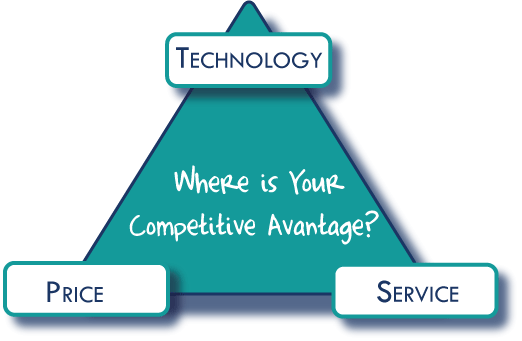The dilemma of where to focus resources and energy is not relegated to just small business owners. When I worked for a division of United Technologies around budget time the conversations were always about the trade offs.
 The R&D Department would argue we needed to invest in new innovative products, to give us a competitive advantage.
The R&D Department would argue we needed to invest in new innovative products, to give us a competitive advantage.
The Sales Team wanted us to work on product revisions which would give us the lowest price in the marketplace.
And as part of the Marketing Group I was always negotiating for more money to improve the customer experience.
Who was right? Which investment would separate us from our competitors? And you can’t do all three, not really, because like the picture on the left the more you emphasize and move in one direction the more you move away from something else. Trying to do all three equally well leaves you standing in the center, not really great at anything.
So how do you decide? Back then the answer was simple, the Carrier Divion in which I worked was built on almost 100 years of innovation That is hard habit to break. And they wouldn’t, we were known for our technology. We were expensive, but we offered customers more in terms of products and services. It was difficuslt when low priced comptitors came into the market and stole share because they were cheaper. But when we tried low priced versions, we were not successful. Our customers still wanted the same level of support, and quality at the lower price.
To be successful, you have to be known for excelling in something. Innovation/Technology, Price, or Service. Which will you choose? Seth Godin had some interesting thoughts in a recent blog post, (Creating sustainable competitive advantage) where he advised against banking on technology which will be copied. He recommended:
- You can own something that’s hard to copy (like real estate).
- You can race down the pricing and scale curve, so it’s cheaper for you to do what you do because you have a head start.
- You can create switching costs, so that the hassle and cost of moving to a cheaper competitor is so great, it’s just not worth it.
- You can build a network (which can take many forms–natural monopolies are organizations where the market is better off when there’s only one of you).
- You can build a brand (shorthand for relationships, beliefs, trust, permission and word of mouth).
- You can create a constantly innovating organization where extraordinary employees thrive.
When we first started, I thought we needed to compete on price, offering a lower cost alternative to larger agencies. And just like when I was in my UTC days, it was hard to walk away from the position which built the company in the early days. But I finally understand, our real advanatge is not our price, but our expertise and service. For small business owners who want more personal service, we are fit. If they want a cheap website, there are plenty of other companies who will build one. When they want to learn what to do with it, they come to us.
You can’t be be great at all three. Where is you best position?
